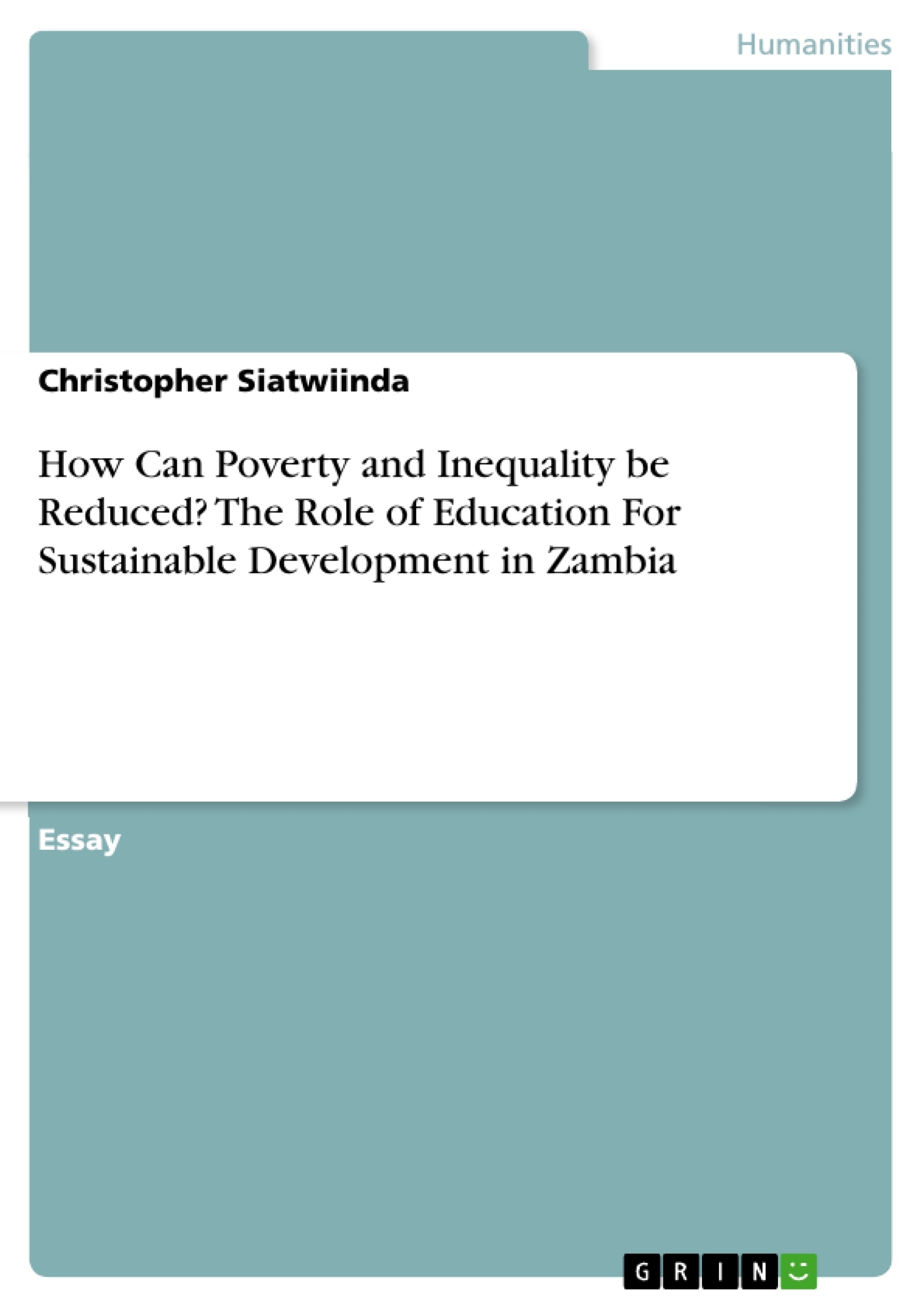This essay addresses the possibilities and challenges for education in providing sustainable development and fighting poverty.
It is believed that education is the greatest investment a person or a country can ever make. This is because education is believed that it plays an important role in the development of a person or a country. Having looked at how education reduces poverty and inequality, it is important also to understand the role of education in promoting sustainable development. In developing the country, there is a very serious concern that development aimed at developing the quality of life can cause imbalance in the human environment. For example, in Zambia, land pollution with plastics meant for carrying things, deforestation in villages by farmers and many more. To reduce these challenges, Kelly (2006) and UNESCO (2008) argues that education has a vital role to play in helping human beings improve their relationship with the environment and contribute to the ultimate sustainability of the planet. This is seen in a number of factors.
Firstly, education provides human resource needed to promote sustainable development. For sustainable development to be achieved, there is need for skilled and trained people to work in various sectors or departments of the country. Secondly, it provides also human resource with a sound mindset to better understand these challenges and how best to address them appropriately and effectively.
Inhaltsverzeichnis (Table of Contents)
- INTRODUCTION
- THE ROLE OF EDUCATION IN REDUCING POVERTY
- THE ROLE OF EDUCATION IN REDUCING INEQUALITIES
- THE ROLE OF EDUCATION IN PROMOTING SUSTAINABLE DEVELOPMENT
- HOW ZAMBIAN GOVERNMENT CAN ENSURE EDUCATION REDUCES POVERTY EFFECTIVELY
- HOW ZAMBIAN GOVERNMENT CAN ENSURE EDUCATION REDUCES INEQUALITIES EFFECTIVELY
- HOW ZAMBIAN GOVERNMENT CAN ENSURE EDUCATION PROMOTE SUSTAINABLE DEVELOPMENT EFFECTIVELY
- CONCLUNSION
- REFERENCES
Zielsetzung und Themenschwerpunkte (Objectives and Key Themes)
This document explores the role of education in reducing poverty and inequalities, and in promoting sustainable development. It specifically analyzes the challenges facing Zambia and proposes ways in which the Zambian government can ensure education effectively contributes to these goals.
- The role of education in reducing poverty
- The role of education in reducing inequalities
- The role of education in promoting sustainable development
- Government strategies to enhance the effectiveness of education in poverty reduction
- Government strategies to enhance the effectiveness of education in promoting equality
Zusammenfassung der Kapitel (Chapter Summaries)
- INTRODUCTION: This chapter emphasizes the importance of education as an investment in personal and national development. It highlights how education contributes to skill development, productivity, and poverty reduction, ultimately promoting sustainable development.
- THE ROLE OF EDUCATION IN REDUCING POVERTY: This chapter explores how education equips individuals with market skills and productivity, leading to higher incomes and improved living standards. It cites evidence from various sources, including UNESCO and research on human capital in Pakistan, to demonstrate the link between education and poverty reduction.
- THE ROLE OF EDUCATION IN REDUCING INEQUALITIES: This chapter delves into the role of education in bridging gaps between the rich and poor, as well as between men and women. It discusses how education provides opportunities for all, empowering individuals and fostering equal participation in decision-making processes. It also references data on women's representation in Zambian government to illustrate the impact of education in promoting gender equality.
- THE ROLE OF EDUCATION IN PROMOTING SUSTAINABLE DEVELOPMENT: This chapter examines the crucial role of education in promoting sustainable development. It emphasizes the need for skilled and trained individuals to address environmental challenges and emphasizes the importance of public awareness and an informed citizenry in fostering a sustainable society.
Schlüsselwörter (Keywords)
The key concepts and terms explored in this document include education, poverty reduction, inequality, sustainable development, human capital, skilled labor, public awareness, government strategies, and the Zambian context. The analysis draws upon various sources, including UNESCO reports, research on poverty reduction strategies, and studies on gender equality in education. The text highlights the significant role of education in tackling crucial global challenges and creating a more equitable and sustainable future.
Frequently Asked Questions
How does education reduce poverty in Zambia?
Education equips individuals with market skills and productivity, enabling them to earn higher incomes and improve their living standards.
What is the role of education in sustainable development?
It provides the human resources needed to address environmental challenges like deforestation and pollution, fostering a sound mindset for problem-solving.
How can education reduce inequalities?
By providing equal opportunities for all, education helps bridge the gap between the rich and poor, and promotes gender equality in decision-making.
What are specific environmental challenges in Zambia?
The document mentions plastic pollution and deforestation in villages as key issues that education needs to address through environmental awareness.
What should the Zambian government do to improve education?
The government needs to implement strategies that ensure education effectively contributes to poverty reduction and sustainable development goals.
Why is education considered the greatest investment?
It is seen as the foundation for both personal growth and national development, playing a vital role in the ultimate sustainability of the planet.
- Quote paper
- Christopher Siatwiinda (Author), 2020, How Can Poverty and Inequality be Reduced? The Role of Education For Sustainable Development in Zambia, Munich, GRIN Verlag, https://www.grin.com/document/590527



